Van Appliances: A Guide to Campervan Galleys, Fridges, Stoves, and Sinks
Having a kitchen that you can cook fresh food is one of the luxuries of van life. Get inspiration for your campervan kitchen appliances here!
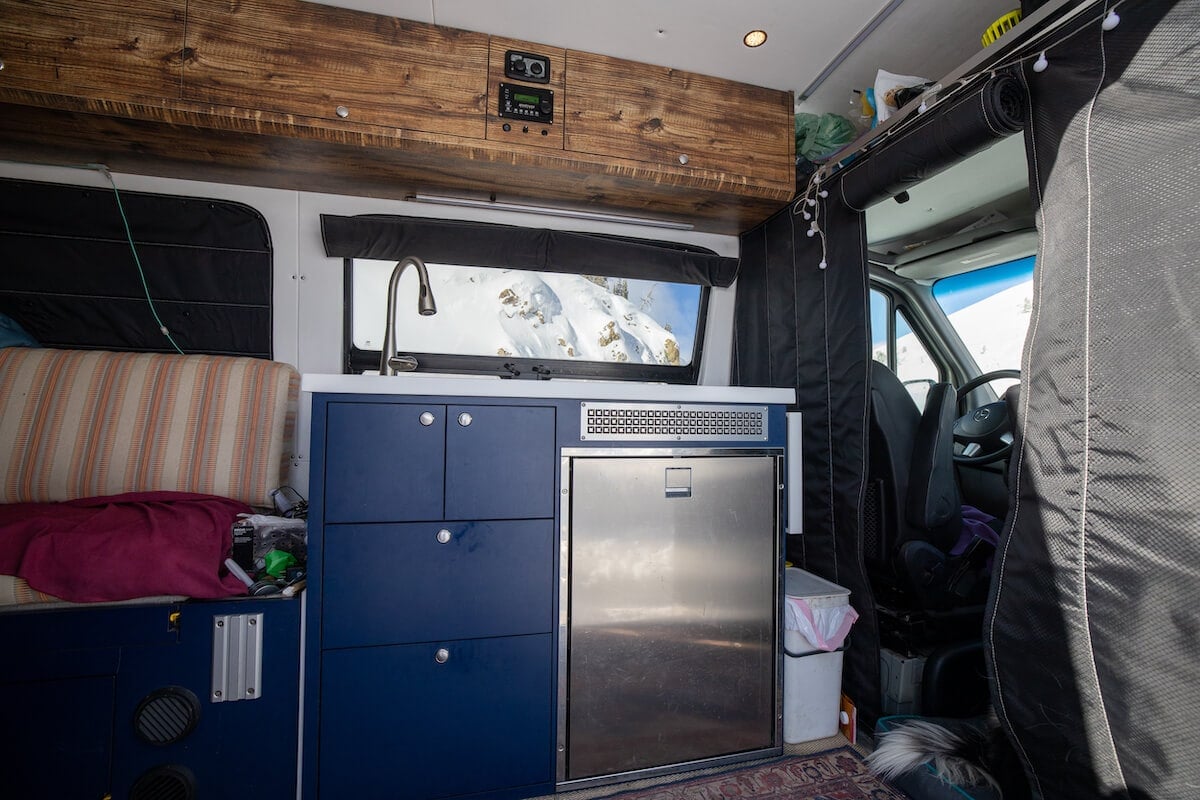
Having the right van appliances in your kitchen can make or break life on the road. We all love a good homecooked meal, so setting up your kitchen space is an important step when designing your van build. With a good campervan fridge, functional sink, and practical stove, preparing meals becomes a lot more convenient, healthy, and fun.
Downsizing from a regular kitchen into a campervan galley can seem daunting at first, but once you narrow down the essentials you’ll be cooking in no time!
The most important things to think about for your van cooking space are the refrigerator, sink, and stove. Just like in a regular house, appliances are typically one of the more costly parts of a renovation, but you tend to get what you pay for. In this post, we walk through the best van appliance options and other considerations to think about.
This post may contain affiliate links.
Get the scoop on the best van appliances for your galley including campervan fridges, sinks, and stoves.

Designing Your Campervan Galley Layout
Before choosing your van appliances, it’s important to plan your galley layout to make sure all the appliances fit and you have a functional space to cook in. There are tons of different layout options out there, so do some research to find a blueprint that works for you. If you’re still in the planning stages, here are some resources to help:
- 15 Campervan Kitchens for Layout and Design Inspiration
- Camp Cooking Kitchen Essentials (to get an idea of how much storage and space you’ll need)
- Campervan Layouts: Tips for Choosing a Floorplan
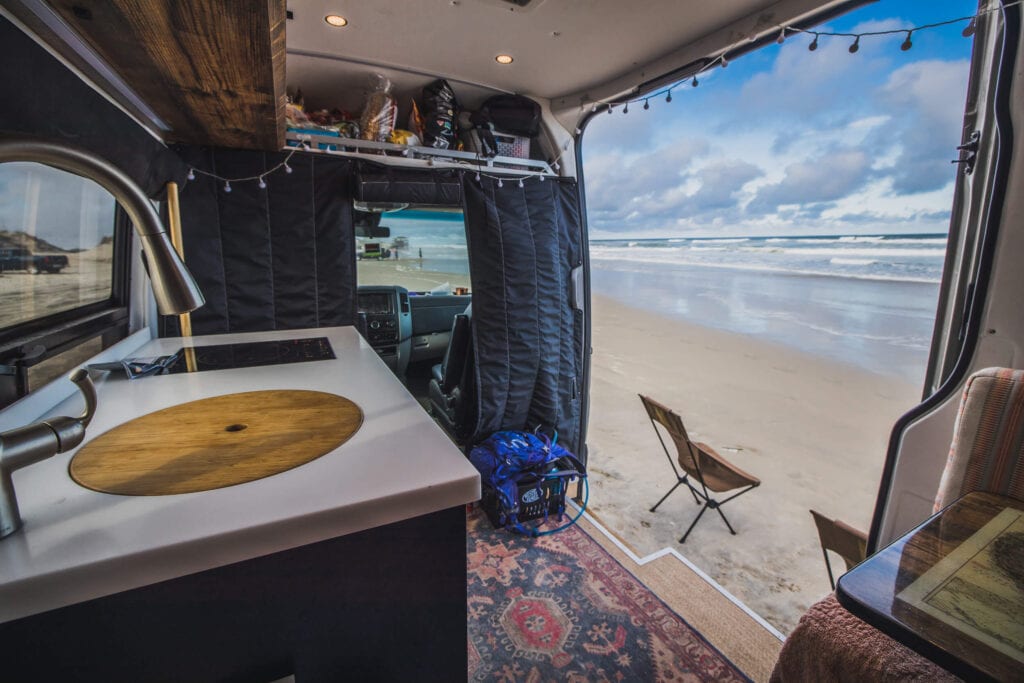
Save this post!
Enter your email & I'll send this post to your inbox! You'll also receive my weekly newsletter full of helpful advice for planning your adventures.
Campervan Fridges
Refrigerators can consume a lot of power and depending on your electrical system, this is a huge thing to think about when getting one for your van galley. Your van’s electrical system will ultimately determine the kind of camper van fridge you can have. While generators and shore power will operate most regular refrigerators, a solar setup might not be able to generate or store enough power.
Your fridge is an appliance that should last a long time so you want to invest in something that is reliable, efficient, and can handle the turbulence of the road.
RV and marine refrigerators are specifically designed for rugged use and high efficiency while using a limited power supply. Most of these run on DC, AC, and/or solar power and have a highly efficient compressor that draws as little power as necessary. The compressor cycles as needed, so it’s not running constantly, which helps consume less power. These are referred to as two-way compressor fridges and they are your best bet if you have a typical van set up with solar panels, which you likely will have.
The other type of fridge that you’ll commonly see, mostly in RVs, are three-way absorption fridges which are propane-powered but can also run off your batteries if needed. If you don’t plan to have solar power, a three-way fridge might be your only option. They require your van to be completely level and like any other van appliance that runs off propane, you’ll need to vent your propane tank to the outside of the vehicle.
We’re going to focus on compressor-style fridges in this post, but I’ll link to some resources at the end for further reading if you are considering a propane fridge.
The two main types of compressor refrigerators are upright (front-loading) and chest-style (top loading). Some have dual-zone fridge/freezers, which are awesome for things like frozen fruit for smoothies, frozen veggies, or other frozen items, especially if you’re going to be off-grid for a while.
Most of the compressor fridges for vans consume between 1 and 3 amps per hour.
Top Loading Refrigerators
Top-loading fridges, also known as chest-style fridges, open from the top. The biggest complaint about these van appliances is that you have to move your top layer of food in order to reach the stuff at the bottom. You can avoid this by organizing your food in different baskets, so you are moving a single basket vs a bunch of individual items to get down to the bottom.
If this sounds frustrating, then a top-loading campervan fridge probably isn’t for you. Some people love them, some don’t – it’s mostly a matter of preference and space. Top-loading fridges do tend to be more efficient and durable than upright fridges.
With a chest-style fridge, you’ll either need to install it on a pull-out drawer or leave enough space to open the lid. They also have a bigger floor footprint than an upright fridge for the same capacity.
Reputable brands for top loading fridges are Dometic, Engel, and ARB. These brands are well-known for some of the leading refrigeration products in the industry. They slowly sip energy so you won’t ever have to worry about too much power draw. Plus, their fridges come in different sizes and models including freezers too, so there are lots of options.
The downside to these brands is the cost. Each fridge tends to run a couple of hundred dollars more than some of their upright fridge counterparts. But if energy efficiency and durability are the priority and your budget allows, you won’t go wrong with one of these fridges in your van kitchen.
Top-loading Refrigerators Pros
- More efficient at keeping food cold
- Tend to be more durable than upright fridges
Top-loading Refrigerators Cons
- Need to move top-layer of food to access items at the bottom
- Bigger floor footprint than upright fridge
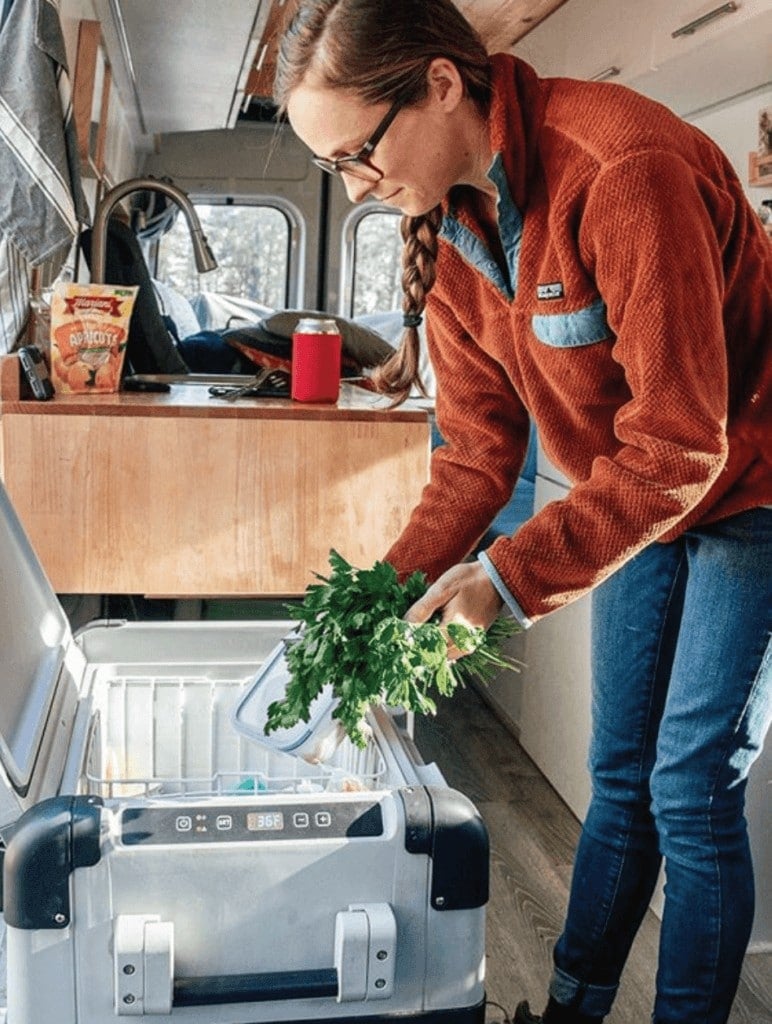
Upright Campervan Fridges
The other type of compressor fridge is an upright fridge that is shaped just like a mini-fridge that you might have in your house. That’s what I have in my van kitchen – the Isotherm Cruise Elegance 85 – meaning 85 liters capacity. It’s the perfect size for my partner and I traveling together in the van. With a little bit of tetris, we can easily carry a week’s worth of fresh food and produce inside.
In my first van, I had the same fridge, except a smaller 65-liter version. We found this to be a little tight for full-time living for two people, especially if you want to keep beverages cold in addition to your food.
Upright Refrigerators Pros
- Smaller footprint than chest-style fridge
- Can be easier to organize and access food
Upright Refrigerators Cons
- Not as energy efficient as chest-style fridges
- Access to food and organization can be tricky if fridge is low to the ground
- Shelves can be unstable and fall down when driving on rough roads
- Food can shift and fall out when opening the door
- Freezer needs to be defrosted every few months
I’ll quickly touch on what I don’t like about my Isotherm fridge. First, I don’t think the organization in this front-loading style fridge is at all superior to the chest-style fridge. You still have to get down on your knees and take everything out to see what’s hidden in the very back of the fridge.
Also, when we drive on rough roads, we’ve had an issue with the shelves falling down which smashes the food. Finally, every 2 months or so, the side of the freezer ices over and has to be completely defrosted. This means taking everything out and utilizing a friend or family’s fridge while it defrosts, which is a pain. For these reasons, I might consider a chest-style next time.
Choosing a Fridge Size
When determining what size campervan fridge to get, think about how much food you’ll be storing and for how long. Ask yourself:
- How many people will you be storing food for?
- How many meals do you plan to cook a day?
- How long do you want to be able to go without needing to resupply?
- How much space will your galley have for a fridge?
As I mentioned above, I have an 85-liter capacity fridge and it works well for the two of us. If you are traveling with a family or solo, consider sizing up or down accordingly.
Pro tip: make sure your refrigeration unit has some sort of ventilation around it because it can overheat. You’ll see in my van kitchen that my fridge has a vent both on top and on the side to help circulate the air.
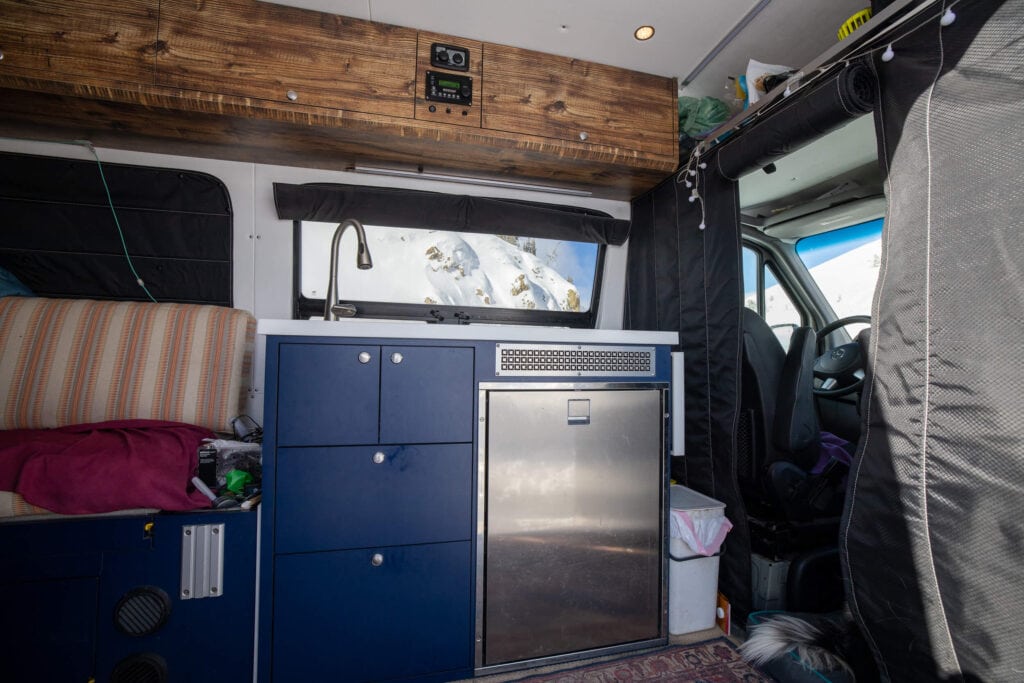
Campervan Stoves
One of the great things about van living is the ability to enjoy home-cooked meals outside with incredible views. But, being able to cook and eat outside isn’t always the case if you’re stealth camping in a city, camping in winter, or the weather just isn’t very nice.
I recommend having the option to cook both indoors and outdoors. While you won’t have the sprawled-out counter space in your van like you would in your kitchen at home, cooking in your van is not as difficult as some people think. It’s possible and easy to have hearty meals every day and it helps to have a kitchen equipped with a good campervan stove.
There are two main options for campervan stoves: induction stoves and propane-powered stoves.
Induction Stoves
Induction stoves are easy to clean and are great for quick meals. However, you’ll need a powerful battery bank and inverter to run an induction stove in your van kitchen. They consume a ton of power and if you don’t take this into account when sizing your battery bank, you won’t actually be able to use the induction stove. Because induction requires a more expansive and thus expensive electrical setup, this is not a budget-friendly option.
For indoor cooking, induction is considered safer since you aren’t combusting gas inside the van. I have a one-burner induction stove that I use almost daily for conveniently making coffee and simple one-pan vegetarian meals. It also comes in handy on bad weather days. Otherwise, I do most of my cooking outside on a camp stove.
My induction stove is recessed in the countertop, but you can also buy portable ones that simply plug into an AC outlet.
Induction Stove Pros
- Safe because they don’t require propane or other combustable gas
- Flat surface for easy cleaning
Induction Stove Cons
- Use a lot of power
- Require an expansive and expensive electrical set-up
- Can only use induction-compatible pots and pans
- Harder to control temperature than gas stoves
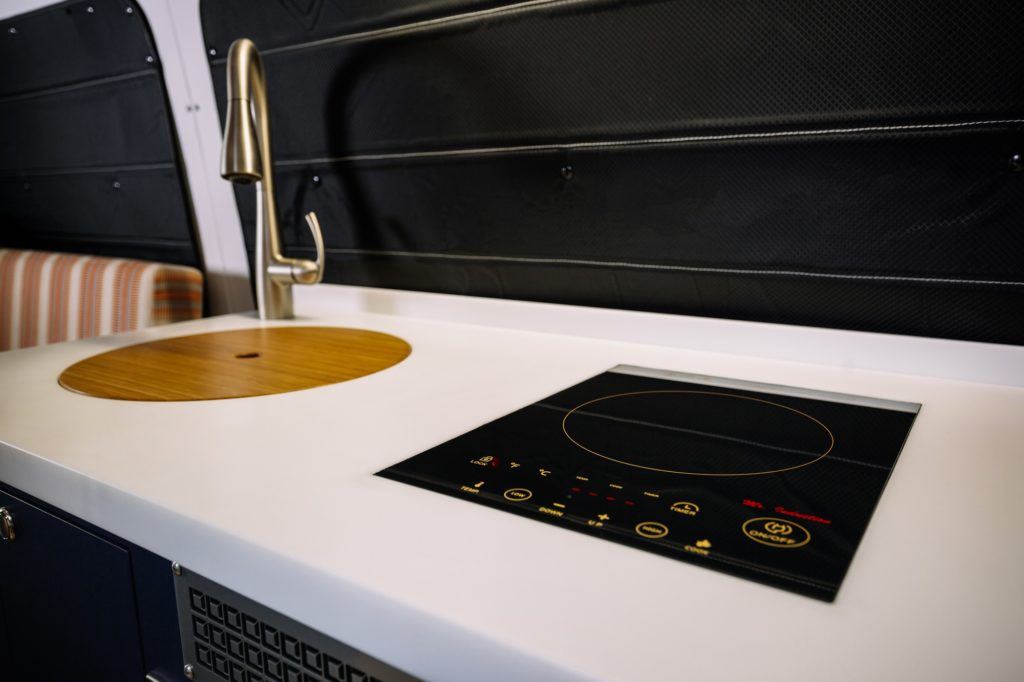
Fixed Propane Stoves
Propane stoves are better for more complicated meals that require specific temperatures and longer cook times. They don’t use electrical power and propane is pretty cheap making propane stoves an awesome budget option. You can buy small propane canisters as you would for a camping stove, but for a more environmentally-friendly approach, I suggest getting a larger refillable tank. Plus, you can also use a larger tank for a propane water heater if you choose to go that route.
Permanently installing a propane stove into the countertop of your van kitchen is one option, but it takes up a lot of counter space and they are a pain to clean. But if you want your van to feel more like a real home, a fixed propane stove is a more budget-friendly option vs. an induction cooktop.
Fixed Propane Stove Pros
- Look really nice
- Requires little to no prior setup
- Can use propane tank for water heater as well
- Easier to cook a wider variety of foods and meals
Fixed Propane Stove Cons
- Pain to clean
- Takes up a lot of counter space
- Need to vent propane tanks outside of van
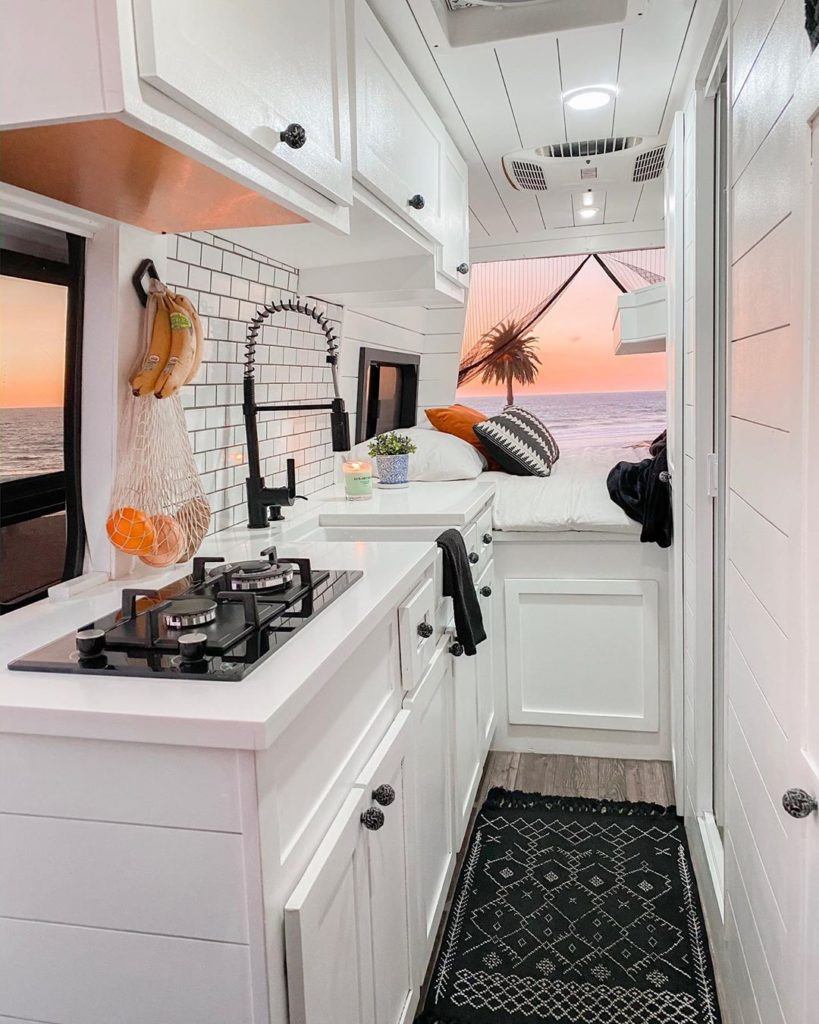
Portable Propane Stoves
Another option is simply using a portable propane camp stove that you can use for cooking both inside and outside. Setting up a camp stove on your counter works just as well as a built-in one and is more budget-friendly. And by utilizing a portable camp stove, you save space on the countertop for other uses when your camp stove is stowed away.
When the weather’s good, you’ll be able to set up outside and your van won’t smell like food, especially if you’re cooking something greasy. If you do cook inside your van with propane, make sure you have proper ventilation to prevent carbon monoxide poisoning – keeping windows cracked is essential, and running a fan if you have one is a good idea too.
Portable Propane Stove Pros
- Can use indoors and outdoors
- Budget-friendly
Portable Propane Stove Cons
- Need good ventilation when using inside to prevent carbon monoxide poisoning
- Requires more time to setup and take down
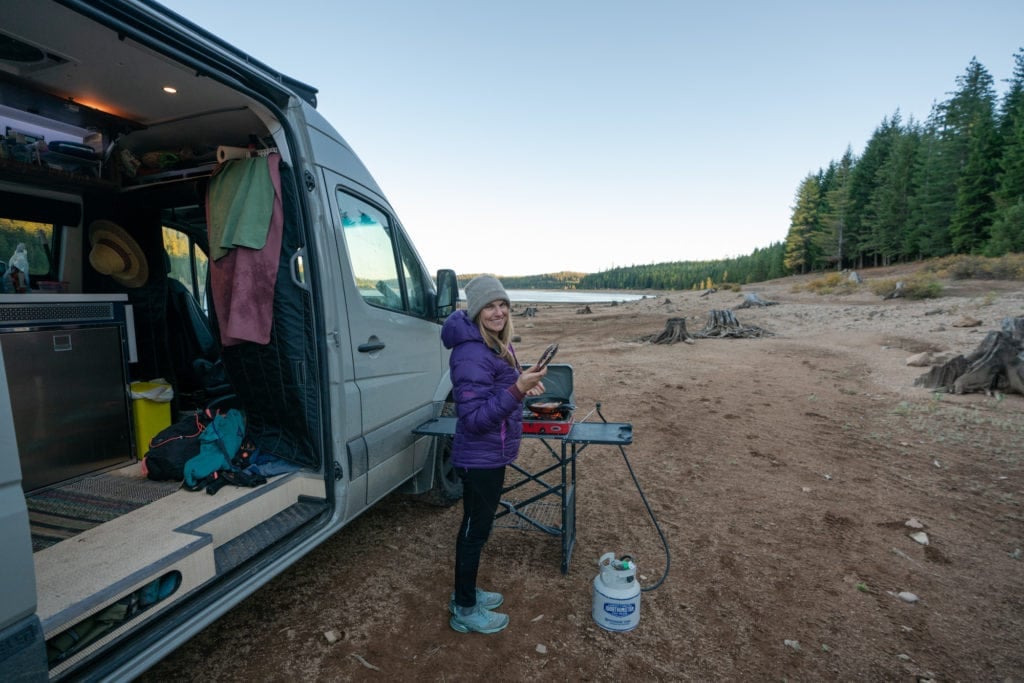
There are other types of stoves on the market, but induction and propane are the two most reliable and popular choices. Once you determine your cooking needs, power capabilities, budget, and space limitations you’ll be able to decide what’s best for you.
Remember, the important thing is to have a functional space, not just a picture-perfect one. If you’re not a big cook in your current life, you probably won’t be in van life either. Use your space efficiently and install what you know you’ll use.
Campervan Ovens
A stove is an essential van appliance needed for cooking a wholesome meal, but if you want an oven in your van kitchen too, you’re in luck! There are a few portable propane campervan ovens out there and people seem to love them.
Most ovens are designed for outdoor use that has steady ventilation so if you do install one inside, it needs constant observation during use and you need to be extra conscious of ventilating properly to prevent carbon monoxide poisoning.
Campchef makes a stove and oven unit that works independently of one another so you can brew fresh coffee and bake bread at the same time. These dual units have a big footprint, though, so you’ll need to decide if it’s totally worth it.
For a more convenient “oven” option, check out this stovetop oven from Omnia which you can store when not in use.
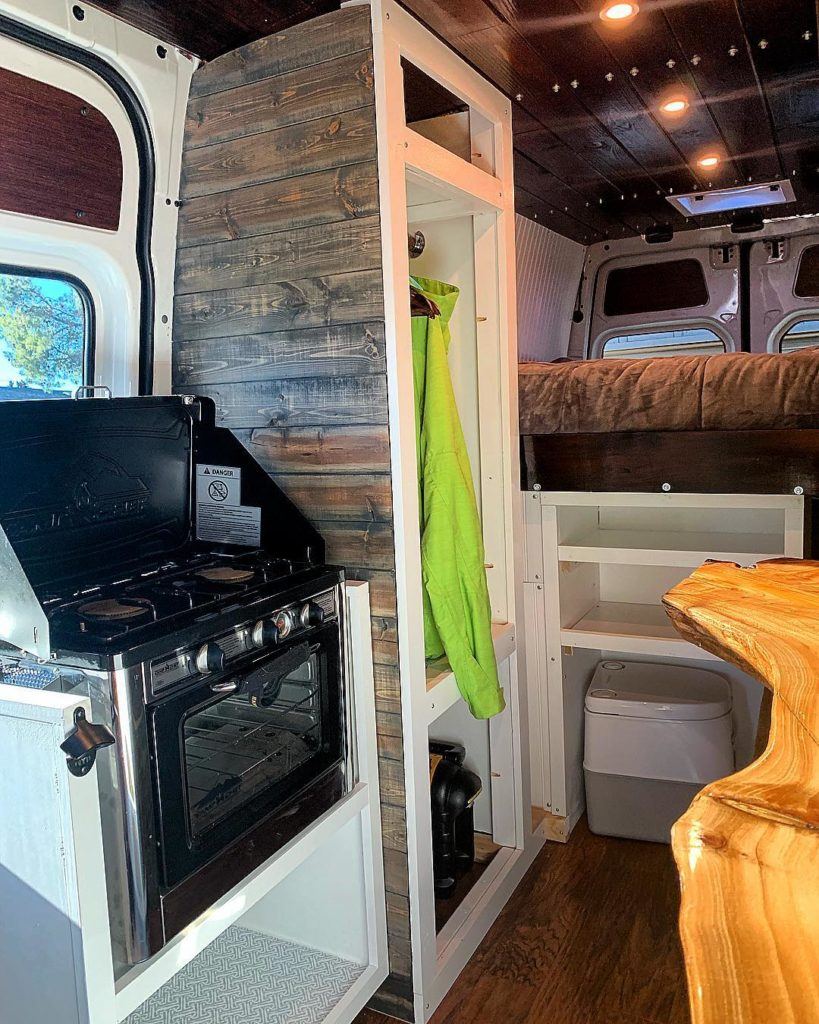
Campervan Sinks
Campervan sinks are pretty straightforward. The main thing to consider is that you want a water basin that’s big enough for cooking, hand washing, and doing dishes. You can find sinks for a few dollars to several hundred dollars, but it’s not necessary to spend a lot on a sink.
Think about what shape sink you’d like and how it will fit with the counter. Both rectangular and circular sinks are common. If space is a concern, which it generally is because vans are small, you can include a cover that will pop into the sink, leveling out with the counter for more space. This really helps maximize the countertop when the sink isn’t in use.
I have a circular dropped-in stainless steel sink with a pulldown faucet in my van. The flexible faucet and spray nozzle make dish duty much easier. Having the ability to swivel the faucet is especially helpful in a confined space and I always have the cover on the sink when it’s not in use for maximum counter space.


Big stores like IKEA, Home Depot, and Lowe’s have sinks within a variety of price ranges. But don’t forget about second-hand stores (like Habitat for Humanity ReStore), junkyards, and construction companies as well. If you shop around you can find some unique sinks for dirt cheap.
When choosing a sink material, keep in mind the weight and durability. For example, a farmhouse sink might look nice, but it’s much heavier than stainless steel and it also won’t be as good at handling the bumps in the road.
Campervan Countertops
Since we’ve covered all the van appliances you’ll need for your kitchen, I wanted to briefly mention van countertops since you’ll probably be choosing that material around the same time you shop for your appliances.
Countertops can be very cheap or expensive depending on the material you choose to use. The things that should influence your choice are material weight, durability, look, and price.
Some popular countertop materials include corian, plywood, bamboo, butcher block, and laminate. IKEA is a great place to source inexpensive countertops that you can cut to your desired size. They have dozens to choose from.
In my second van kitchen, my counter was made of Avonite. I haven’t seen this used in too many vans apart from ones built by Outside Van. It’s an acrylic, lightweight, and heat and scratch-resistant material. It’s also LEED-certified, which is a green building standard, meaning it’s an eco-friendly product. It’s lighter than granite and quartz and more durable than corian, while accomplishing the same white modern look.
Both of my vans have had white countertops, but next time I may go with wood-colored. The white avonite is extremely easy to clean, but also shows spots so it requires frequent wiping down.
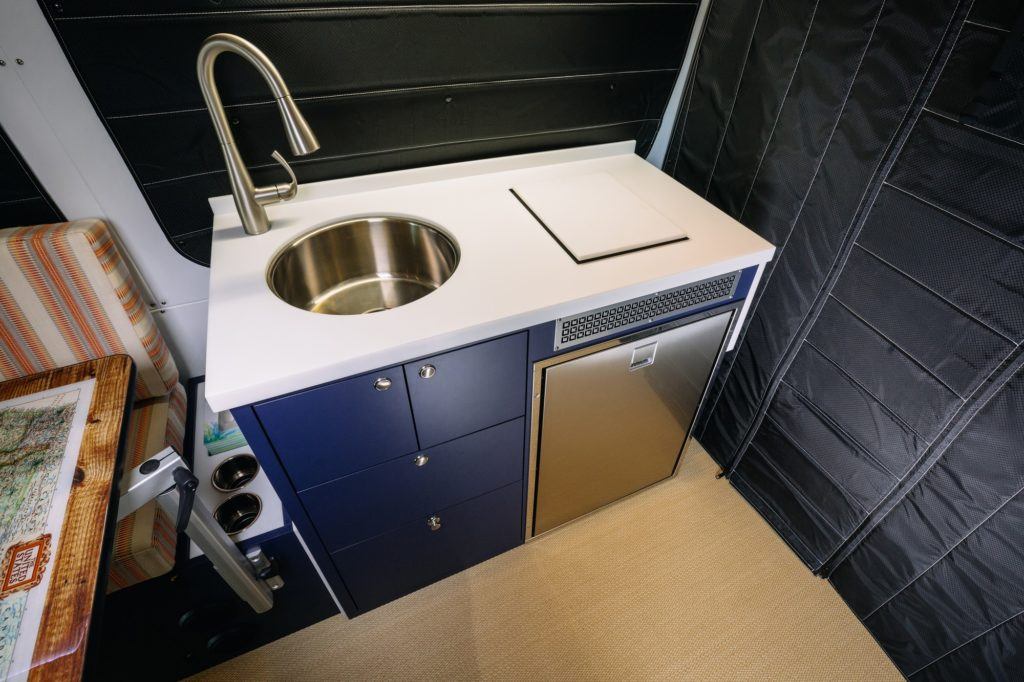


Van Appliances Resources Section
Helpful Article
Instagram accounts featured in video
- @freshoffthegrid
- @vanlifebuilds
- @courtandnate
- @ourvanquest
- @flowwiththesoul
- @vanlifeconversionsuk
- @thevanconversionexcursion
What van appliances do you have in your campervan galley? What questions do you still have about campervan fridges and campervan stoves? Leave a comment below make sure to sign up for our van life newsletter here.

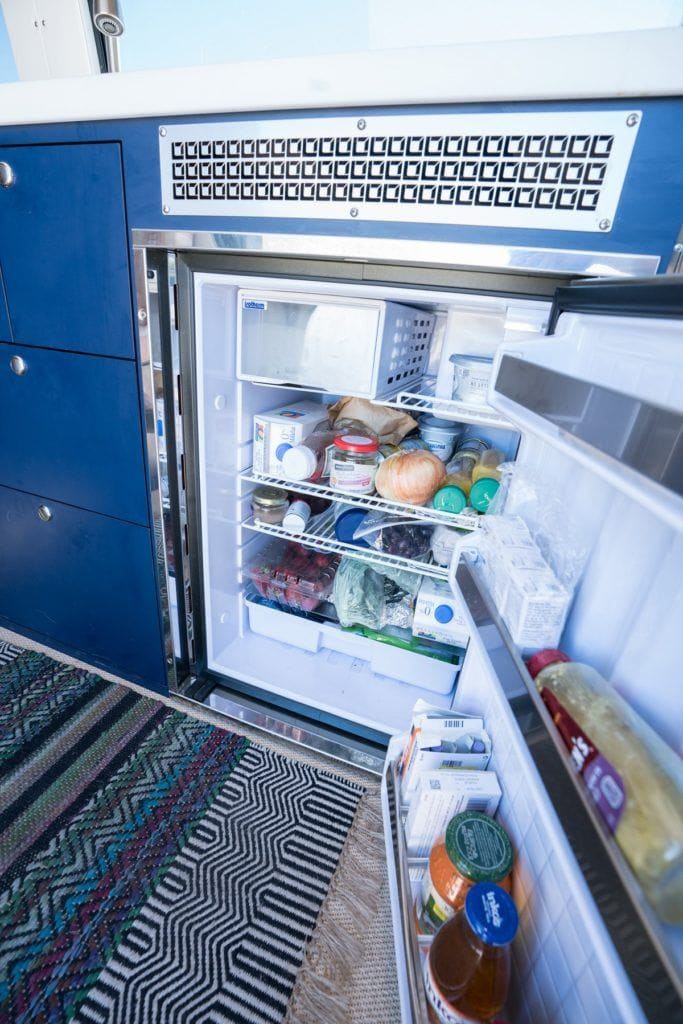

There’s a third option for a hob – diesel powered. These are sealed units, which such in air from outside and exhaust fumes to outside too. Some also double up as a heater for the van.
They are not cheap, but simpler/safer than plumbed in gas heaters, and you already have the fuel.
For example, the WALLAS XC Duo.
Hello, any thoughts on a toaster oven or microwave? I realize they take up a lot of space and probably use a lot of electricity too. But when I cook I usually have leftovers that I reheat in subsequent meals.
Hi Amy, you’re correct that those appliances take up space & pull quite a bit of electricity, but it definitely comes down to personal preference (and what your power system can handle). We do know a few van lifers with appliances like these in their vans, or an Instant Pot (what I carry in my van, although I’ve gotten used to eating most leftovers cold).
Consistently excellent content! Thanks.
For car campers or those of us in smaller vans, Flame King makes refillable small propane bottles (Like the 1-pound green ones, but refillable).
See https://flameking.com/products/1lb-refillable-program-2/
Hi Kristen & Happy Sunday!
Such a wonderful and thorough site! Plus, love the name of your blog! Apologies if this is stated somewhere and I haven’t seen it yet & I am new to this, so bare w/ my entry level question please 🙂
How loud are the appliances and anything else that is either being powered (ex: fridge must always be powered, or other things you find loud or loudish) or powering things (batteries, generators) when you are parked, working, sleeping. Ex, small fridges in hotels are so loud (even my fridge in my apt is loud), so curious how this is? Unfortunately, I am a light sleeper & otherwise sensitive to sounds, so this is a big thing for me to consider since everything is in a small space.
Thank you, kindly!
Hi Dana – I can only speak to the fridge I’ve had which is Isotherm Cruise Elegance 130, but I never found it to be loud at all.